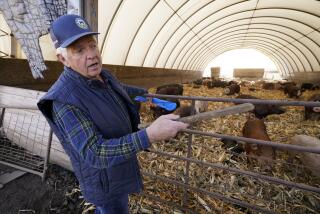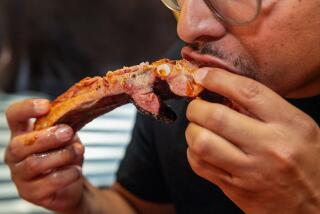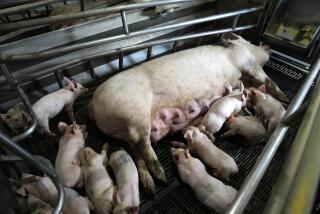Oscar Mayer, CKE ask suppliers to get rid of pig gestation crates
- Share via
It was a big day for pig rights advocates.
Oscar Mayer, one of the biggest names in pork products, announced Friday that it would work with farmers to do away with the gestation crate system that confines female pigs in cages.
“While the Oscar Mayer brand does not raise pigs,” theKraft Foods Inc.-owned brand said in a statement, “the plan is to source all pork from suppliers who can provide pregnant sow housing that safely allows for greater movement for the animal.”
Also Friday, CKE Restaurants Inc.— which has more than 3,000 fast-food outlets, including the Carl’s Jr. and Hardee’s brands — said it would rid its pork supply system of the crates that have been called cruel by animal rights advocates.
“CKE has requested that its pork suppliers develop practical and sustainable alternatives to the use of gestation stalls,” the Carpenteria company said in a statement, “and to transition to a group-housing environment for sows.”
Oscar Mayer and CKE were far from the first to say they would work toward the elimination of gestation crates. Others that previously announced similar plans include McDonald’s, Burger King, Wendy’s, Denny’s, Safeway, Smithfield Foods and Hormel.
Laws banning the practice have already been passed in several states.
In 2008, California voters approved Proposition 2, which said that pregnant pigs must “be confined only in ways that allow these animals to lie down, stand up, fully extend their limbs and turn around freely,” according to the official state summary.
The law goes into effect in 2015.
The Humane Society of the United States, which has strongly advocated against the crates, applauded the announcements by Oscar Mayer and CKE.
“You needn’t look further than a picture or a video of these pigs lined up like parked cars to know that it doesn’t make sense,” said Matthew Prescott, food policy director for the Humane Society.
“Not allowing a 500-pound intelligent social animal to move around for her whole life is one of the worst forms of animal cruelty.”
But Oscar Mayer and CKE said they were giving their suppliers a decade to make the transition. Both companies said in their statements that they were aiming toward full implementation in 2022.
“The reason for 2022 is we understand it will take suppliers time to transition,” Oscar Mayer spokeswoman Sydney Lindner said. “We selected that date after careful consideration.”
CKE declined requests for an interview.
Prescott said that even with the time lag, the Humane Society considered this an important step.
“We certainly wish it could happen sooner than 10 years,” he said. “Considering the complexity of the pork industry, CKE’s timeline is definitely a positive thing.”
The banning of gestation crates has been opposed by many pork producers.
Dave Warner, a spokesman for the California Pork Producers Assn., said Friday that the cages are an important tool for increasing yields and for allowing farmers to provide sows with individual care.
“Economics aside, pork producers who use” gestation crates “don’t want to move from them because it is the best system to give [pigs] the care they need,” Warner said.
Many pig farmers moved out of California since Proposition 2 passed and have settled in states such as Wyoming that have not banned gestation crates, he added.
More to Read
Inside the business of entertainment
The Wide Shot brings you news, analysis and insights on everything from streaming wars to production — and what it all means for the future.
You may occasionally receive promotional content from the Los Angeles Times.










